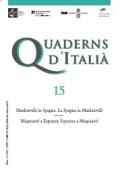Istorie Fiorentine de Maquiavelo : una primera definición moderna de corrupción
Article Sidebar

Main Article Content
Eloy García
The Spanish translation of Machiavelli’s Historie fiorentine (1525) provides an excellent occasion to reconsider a fundamental yet widely neglected work by the Florentine secretary which was to be essential in the thought of such remarkable authors as Montesquieu, Rousseau and Constant. Three key ideas are put forward in this work. Firstly, the idea of History as a means to acquire political knowledge, an idea based on the categories of the ascent and the decline of nations borrowed from Polybius (divergent, though, from the ancient Greeks’idea of history as a «closed circle»). From this perspective, «decline» (or «decadence ») is conceived as a phenomenon associated with corruption, viewed, in turn, as a social, collective process of law degradation in which «him who departs from what he does to do what he must do, seeks his own ruin instead of his own benefit». Finally, from Machiavelli’s point of view, the history of Florence is considered as an example of what should never be done, an anti-example: since Florence was corrupted both internally (civilly) and externally (military), any form of self-government based on the participation of all civil forces was impossible, which accounts for Florence’s loss of freedom.
Article Details
How to Cite
García, Eloy. “Istorie Fiorentine de Maquiavelo : una primera definición moderna de corrupción”. Quaderns d’Italià, no. 15, pp. 117-26, https://raco.cat/index.php/QuadernsItalia/article/view/226288.